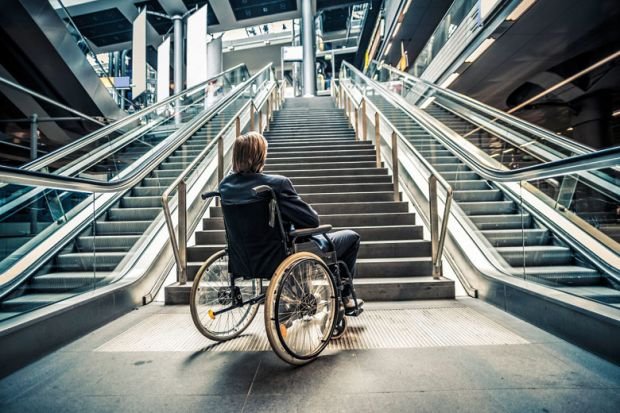Study Abroad with a Disability program are becoming increasingly accessible, allowing students with diverse abilities to broaden their horizons and gain valuable global perspectives.
This guide empowers students with disabilities to navigate the exciting world of study abroad. We’ll address common concerns, explore resources for a smooth transition, and celebrate the unique benefits of international education for individuals with disabilities.
Shattering Stereotypes on Study Abroad with a Disability
Many believe that Study Abroad with a Disability presents insurmountable challenges. However, with proper planning and access to resources, international education can be an enriching and transformative experience for everyone.
Read Also: Assessment and Evaluation in Global Education
Here are some common misconceptions about Study Abroad with a Disability:
- Limited Options: A diverse range of study abroad programs cater to a variety of needs. Students can choose from accessible campuses, supportive host countries, and inclusive learning environments.
- Logistical Hurdles: Accessibility concerns can be addressed. Many universities and program providers offer pre-departure assistance with housing arrangements, transportation needs, and academic accommodations.
- Social Isolation: Studying abroad allows for cultural exchange and fostering new friendships. Students with disabilities can participate in social events, join student clubs, and build meaningful connections in a new environment.

By challenging these misconceptions, we can empower more students with disabilities to embrace the potential of international education.
Read Also: National Chiao Tung University Scholarship for International Students
Accessibility and Accommodations
Accessibility is paramount for a positive Study Abroad with a Disability experience. Here’s what you need to consider:
- Accessible Housing: Look for programs that offer accessible housing options, such as wheelchair-accessible rooms, elevators, and adapted bathrooms.
- Transportation: Research public transportation options and inquire about accessible routes or disability-friendly taxis in your host city.
- Academic Facilities: Ensure classrooms, libraries, and other academic facilities are accessible, with features like ramps, assistive technology, and note-taking services available.
- Support Services: Many universities offer disability services offices that provide academic accommodations, learning support resources, and personalized assistance.
Investigate the accessibility features of your chosen program and university. Don’t hesitate to request additional information or clarification regarding services and support available for students with disabilities.
Legal Protections and Advocacy
Students with disabilities have the right to equal access to education and participation in study abroad programs.
Here are some key considerations:
- Anti-discrimination Laws: Familiarize yourself with the anti-discrimination laws in your host country regarding disability rights. These laws can help you advocate for reasonable accommodations during the application process and throughout your studies.
- Disability Services: Universities are often obligated to provide reasonable accommodations to students with disabilities. Explore the disability services offered by your chosen university and learn how to request the specific accommodations you need.
- Self-Advocacy Skills: Develop strong self-advocacy skills. Be clear and confident in communicating your disability-related needs during the application process, pre-departure orientation, and once you arrive at your host institution.
Understanding your legal rights and honing your self-advocacy skills will empower you to navigate Study Abroad with a Disability programs with confidence.

Preparing for Your Study Abroad Adventure
Study Abroad with a Disability requires thorough preparation. Here are some very imporant steps to take:
- Research is Key: Research potential study abroad destinations and universities. Look for programs with a history of inclusivity and accessibility for students with disabilities.
- Disability Disclosure: Be transparent about your disability needs during the application process. Work with your home university’s disability services office to obtain documentation outlining your requirements.
- Documentation Matters: Gather necessary documentation, such as doctor’s letters, accommodation plans, and proof of disability status, translated into the local language if necessary.
Read Also: Your Guide To Teaching English in Sri Lanka
Utilize online resources and disability travel blogs to gather insights and tips from other students who have successfully participated in Study Abroad with a Disability programs.
Navigating Social and Cultural Considerations
Cultural attitudes towards disability can vary greatly. Here’s how to prepare for social interactions abroad:
- Cultural Competence: Learn about the cultural perspectives on disability in your host country. This will help you navigate social situations and build bridges with local communities.
- Communication Strategies: Develop effective communication strategies. Consider cultural nuances and be prepared to advocate for your needs in a respectful and clear manner.
- Building Inclusive Communities: Create an inclusive learning environment. Advocate for disability awareness workshops and promote open communication with classmates and professors.
By embracing cultural differences and fostering inclusivity, you can ensure a rich and rewarding social experience during your Study Abroad with a Disability program.
A Network of Support
Study Abroad with a Disability doesn’t have to be a solo adventure. A powerful support network can be invaluable:
- Disability Services Offices: Disability services offices at both your home university and host institution are crucial resources. They can provide guidance on requesting accommodations, accessing academic support, and connecting with relevant services on campus.
- Peer Mentorship Programs: Connect with peer mentors who have experience studying abroad with a disability. Their insights and advice can be incredibly valuable in navigating challenges and maximizing your experience.
- Online Communities: Join online communities dedicated to students with disabilities studying abroad. These online forums offer peer support, a platform to share experiences, and access to valuable resources.
Read Also: Teaching English in Hong Kong, China: Embrace the Dynamic Dragon City
Don’t be afraid to reach out for help! Utilize the available support systems to ensure a smooth and enriching Study Abroad with a Disability experience.
Study Abroad with a Disability can be a transformative journey filled with academic growth, personal exploration, and cultural exchange. By planning ahead, advocating for your needs, and leveraging available resources, you can overcome any obstacles and embrace this incredible opportunity.
This guide has equipped you with the knowledge and tools to navigate the world of international education. Remember, with a positive attitude, a willingness to adapt, and a strong support system, you can make Study Abroad with a Disability a resounding success. So, go forth, explore, and expand your horizons on the global stage! The world awaits your unique perspective and vibrant spirit.
Trust you found our article on “Study Abroad with a Disability” helpful. follow our website for more exciting and informative Articles like this.
